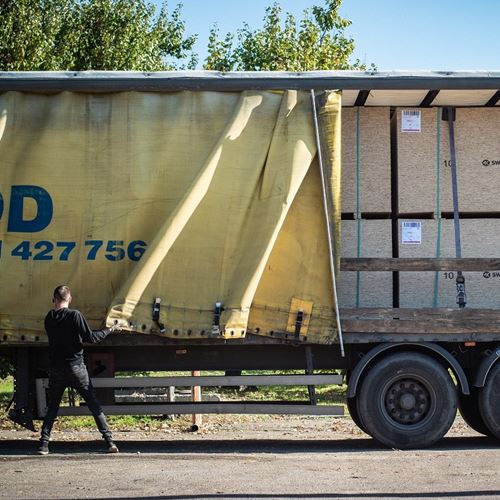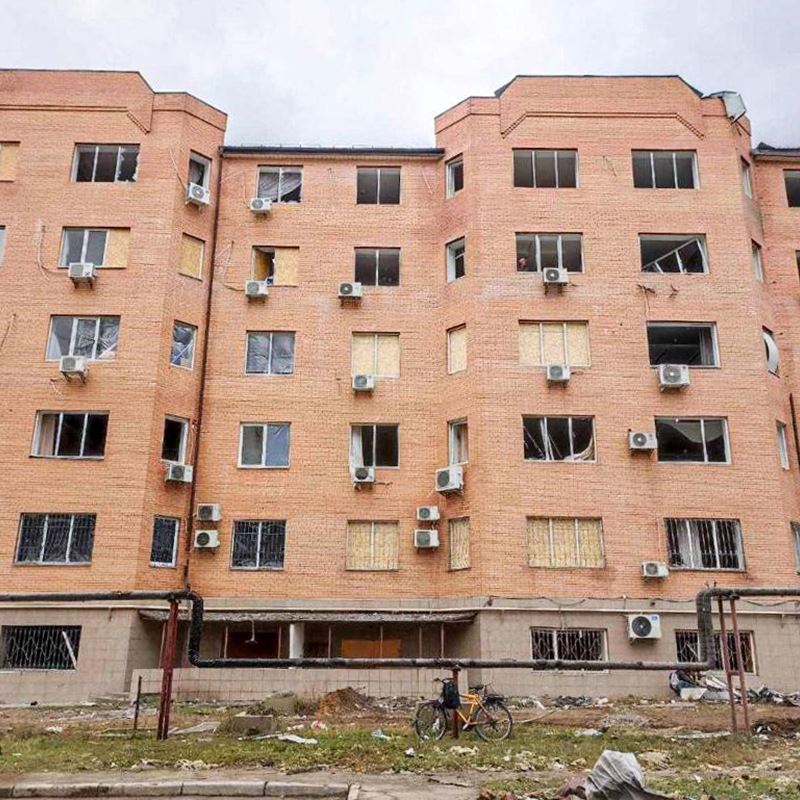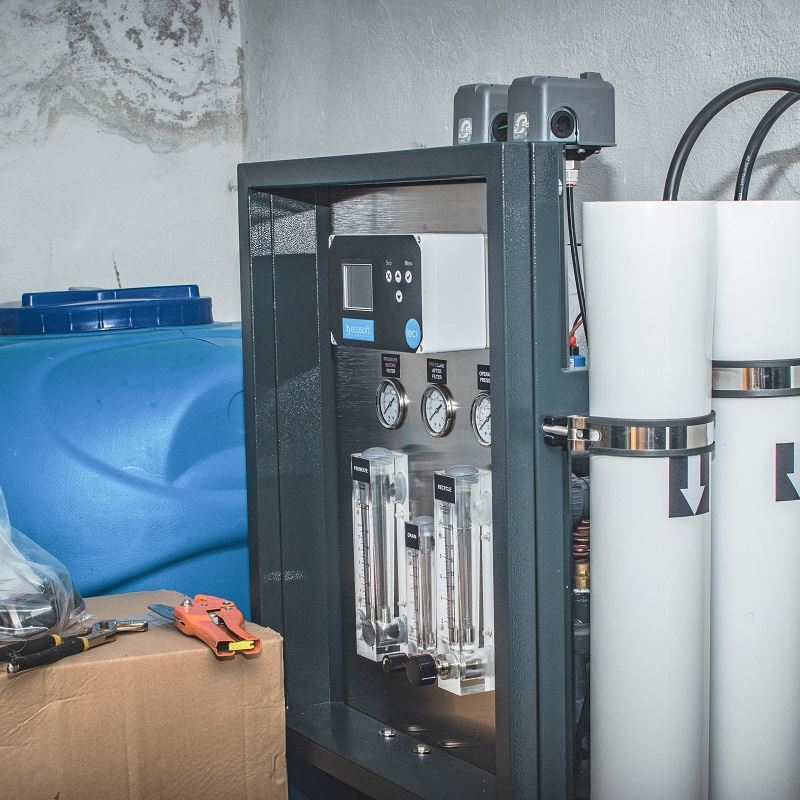Urgent support to Mykolaiv: Safe water and house repairs before winter
Lack of safe drinking water and massive war damage on residential housing often left without doors and windows – these are brutal facts of life in Mykolaiv in southern Ukraine. As part of its emergency winterisation response, DRC supports the delivery of mobile water purification plants and building materials for the urgent repair of houses damaged by explosions.

Mykolaiv is one of the areas in southern Ukraine with significant parts left in ruins due to intensive and repeated shelling since the war broke out in February 2022. More than 25 % of all apartment buildings are estimated to be damaged. In addition, broken pipes that used to deliver water from the Dnipro River to the urban supply system in Mykolaiv have left the city’s 250,000 residents without a functional and reliable source of drinking water.
With the support of the Danish International Development Agency (Danida) DRC now works with Mykolaiv Municipality to enable emergency housing repairs before the winter temperatures will drop further. At the same time, the first of a series of new specialised water points are established to secure safe drinking water at key locations across the city.
Windows and doors are gone
Currently, only half of the population of 500,000 remain in Mykolaiv. The rest, primarily women, children and the elderly have fled and are currently displaced into other areas of Ukraine or across borders. Millions have crossed into neighbouring countries to stay in - or transit - through Poland, Moldova or Romania.
Back in Mykolaiv, local Ukrainian authorities are trying to assess the damages and start repairs. They estimate that over 860 out of 3,300 apartment buildings are damaged from blasts and missile attacks - 50 of them were directly hit by rockets and with hundreds of roofs damages and doors and windows blown out by blasts. Mykolaiv Municipality requested for urgent help to undertake emergency repairs of residential areas before hard winter sets in.

Safe water and house repairs before winter. Embassy of Denmark in Ukraine. Mykolaiv, November 2022
A representative of the Department of Housing and Communal Services of the Mykolaiv City Council, Ihor tells:
‘We have already closed many spaces from windows and doors that were blown out by shelling and blast waves. These repairs allow people to consider staying on in their homes in Mykolaiv over the winter and to be better protected from cold temperatures, snow, wind and rains. We are working to install more panels to cover damages in both residential and non-residential premises and will close off and create smaller spaces that can better be heated. This will both protect people and preserve energy.’
According to Ihor, it is not yet time to refurbish the buildings. Winter is coming, missile attacks still occur, and these can cause further or even worse damage. ‘We can only wait for now and look for an interim solution to get through the winter. In the future, we hope that there will be a better opportunity to work on restoring buildings. They need it badly,’ he says.
Mobile water treatment plants to cope with salinity and winter
In Ukraine, municipalities have so far been used to taking fresh water from the rivers, purify and deliver the drinking water through the infrastructure that is now increasingly targeted and - in many cases - damaged to an extend where it cannot be easily repaired.
To prepare for winter and provide urgent support, 50 water treatment systems have just been installed through DRC with funds provided by Danida. These new water plants are all installed and kept at indoor locations to protect them from freezing as winter comes and in places across Mykolaiv City from where people can now find safe drinking water, including some at the local hospital.
Mykolaiv Oblast used to get its water from a source in the Dnipro River located in neighbouring Kherson Oblast. However, the pipe in Kherson taking water from the Dnipro River was destroyed and forced authorities in Mykolaiv to seek other sources. They have tried to use water from two rivers in their own area - Ingul and Pivdennyi Buh - both closer to the sea and therefore with salinity that is ruining Mykolaiv’s water purification system designed for regular fresh water from a river.
“Currently, the only source of water available is at the mouth of the river where it meets the sea and therefore with both saline and fresh water. The salt level is high and even after standard purification, which was used for water from the Dnipro River previously, it cannot be consumed says Ihor who explains that the water provided in Mykolaiv can now only be used for technical needs and is not even recommended for washing dishes.
Although the new water points provide safe water, many people continue to struggle to fetch water daily.
‘Every evening, I need to collect drinking water for my home and for my mother’s apartment on the 8th floor," tells Maria*.
Alternative infrastructure during the summer
It was easier to cope with the lack of drinking water during the summer when the infrastructure started getting hit and eventually did not function. At that time, the municipality founds an alternative way and was able to supply drinking water through 12 points with flexible tanks across the city and by using trolleybuses and trams to deliver water. This approach does not work during winter when the temperature may drop to as low as minus 30 degrees Celsius.
“We know that the water will soon freeze, and it will be impossible to distribute it in the streets. The authority drilled over wells, but the quality of water is not good enough for the consuming on regular basis. That is why the city asked DRC to deliver water treatment plants that can handle the specific type of water available,” says Ihor.
Municipal water system eroded due to salinity
The saltwater from the new nearby sources in the two rivers has created significant damage to the central water system and continues to ruin the old cast iron pipes and pumps from the inside.
“The number of pipe bursts is 10-15 times higher now. The salt destroys the pipe network, it bursts, and we see this damage around the city. When it was 2-5 bursts a day, it was one situation that was manageable, but now, when we have 40-60 bursts a day, it is completely different. This problem is getting out of hand, and the municipality is overstretched with constant repairing”.
The city authority is currently developing options for replacing some indoor pipes with alternatives made of plastic or polypropylene. New pumps to deliver water to the central city heating system during the winter period is also on the way to Mykolaiv.
*Name changed

A new water treatment plant was installed in a hospital. ©DRC Ukraine. Mykolaiv, Svitlana Vovk, November 2022.